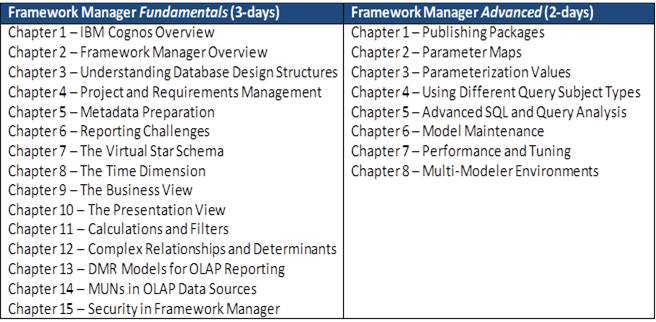On April 15th, Ironside hosted a TM1 Performance Modeler vs. Architect Comparison webinar covering the different features of these powerful development tools. This webinar focused on how TM1 Performance Modeler’s tools and wizards help non-technical contributors develop and maintain their own TM1 servers with minimal support from the IT department. Read more
Tag Archive for: IBM
 Ironside is pleased to now offer online versions of our IBM SPSS training courses. The first SPSS online course offering is our May 12th Introduction to IBM SPSS Statistics course. This two-day course is suited for managers, beginning statisticians and programmers, and market research professionals interested in understanding the basics of how to perform data analysis using IBM SPSS Statistics and who want a solid introduction to the statistical capabilities of the program.
Ironside is pleased to now offer online versions of our IBM SPSS training courses. The first SPSS online course offering is our May 12th Introduction to IBM SPSS Statistics course. This two-day course is suited for managers, beginning statisticians and programmers, and market research professionals interested in understanding the basics of how to perform data analysis using IBM SPSS Statistics and who want a solid introduction to the statistical capabilities of the program.
For a complete listing of Ironside’s training offerings, please visit the Ironside website. If you have any questions or would like additional information, please contact us at 781-860-8840 ext. 802 or training@ironsidegroup.com.
 Ironside is happy to announce the release of our new, enhanced, and fully-revised Framework Manager curriculum. This update combines customer suggestions with expert insights from Ironside instructors and consultants to form the most comprehensive Framework Manager course available today. These two classes represent the current best-of-breed thinking around metadata modeling in the BI space.
Ironside is happy to announce the release of our new, enhanced, and fully-revised Framework Manager curriculum. This update combines customer suggestions with expert insights from Ironside instructors and consultants to form the most comprehensive Framework Manager course available today. These two classes represent the current best-of-breed thinking around metadata modeling in the BI space.
Built around the latest IBM Cognos 10.2.1 technology, these two classes (Fundamentals and Advanced) provide a cumulative 5-day program that gradually builds a complete understanding of the metadata modeling process. Each chapter contains conceptual information and hands-on, practical demos and workshops.
New Course Features
Using the original Ironside Framework Manager curriculum as a foundation, we have developed many additions to it that further flesh out the intricacies of metadata modeling and supplement the already existing content. Below are some highlights of new material included in the Framework Manager Fundamentals and Advanced courses:
• Overview content describing in more depth how Framework Manager fits into and interacts with Cognos as a whole.
• Detailed descriptions of different database design structures and how best to make those structures available through Framework Manager.
• Key reporting requirements and how gathering them can set your project up for success.
• Deepened explorations of the core modeling layers and the objects used within them.
• Rich new chapters investigating DMR options in Framework Manager, determinants, and security.
• Full discussions of parameter maps, session parameters, and implementing them in calculations and filters.
• Enhanced content around accessing the SQL back end that governs how data appears in Framework Manager.
• Crucial performance tips and strategies for working in multi-modeler environments.
Development Process
The top priority during the development process was to create course that provides an all-inclusive and cohesive understanding of all the Framework Manager features and functionality, promoting an understanding of the entire metadata modeling process from end to end. To achieve this, we enlisted the guidance of our technical trainers with years of Cognos and technical training experience, as well as our technical consultants, to provide real-world, practical modeling perspectives.
Course Structure
Below is a listing of the modules and topics covered in the Framework Manager curriculum.
Upcoming Framework Manager Classes
Below is a listing of several of the upcoming public Framework Manager courses.
IBM Cognos 10.2.1 Framework Manager Fundamentals and Advanced Training Courses- Ohio
Mon Apr 21, 2014, 8:30 AM – Fri Apr 25, 2014, 4:30 PM
Worthington, OH
IBM Cognos 10.2.1 Framework Manager Fundamentals and Advanced Training Courses- Detroit
Mon Apr 28, 2014, 8:30 AM – Fri May 2, 2014, 4:30 PM
Detroit, MI
IBM Cognos 10.2.1 Framework Manager Fundamentals and Advanced Training Courses- Miami
Mon May 12, 2014, 8:30 AM – Fri May 16, 2014, 4:30 PM
Doral, FL
IBM Cognos 10.2.1 Framework Manager Fundamentals and Advanced Training Courses – Atlanta
Mon Jun 2, 2014, 8:30 AM – Fri Jun 6, 2014, 4:30 PM
Atlanta, GA
IBM Cognos 10.2.1 Framework Manager Fundamentals and Advanced Training Courses – DC
Mon Jun 16, 2014, 8:30 AM – Fri Jun 20, 2014, 4:30 PM
Washington, DC
Join us on The Road to IBM Vision as we prepare for IBM’s premier global conference for finance, risk management, and sales compensation professionals coming to Orlando, Florida from May 18-21! In preparation for Vision, we will be hosting two exciting webinars: TM1 Performance Modeler and Architect Comparison and Introduction to IBM Cognos Disclosure Management. Read more
Salesforce.com, most commonly implemented for its customer relationship management (CRM) platform, is a well-known industry leader in client relationship management as well as social performance management, sales performance management, and other areas. The IBM Cognos enterprise combined with Salesforce data can help your organization build a single view of your business and create reports, dashboards, and scorecards for analyzing your sales information. A few quick benefits of integrating Salesforce with Cognos are as follows: Read more
When creating multidimensional models with IBM Cognos Transformer, many different types of data sources can be utilized such as reports, packages, Excel, and comma delimited files to design the model. Also various work environments may be used such as TEST, DEV, and PROD all of which have different server locations. Read more
At first glance, IBM Cognos TM1 and Cognos Planning have similar features. They both leverage a multicube architecture and support complex, cross-cube calculations.
The primary differentiating feature of IBM Cognos TM1 can be found in its efficient calculation engine and its method for storing data. When users enter data into most other planning applications, a read/write procedure is performed to reflect the change in a database stored on a hard disk. In contrast, IBM Cognos TM1 calculations and data storage happens in memory/RAM. This allows entered data to be immediately updated within the cube and retrieved. As a result, data is available real-time, which greatly enhances both the performance of queries and ability to perform what-if analytics. Read more
Many are looking to IBM Puredata System for Analytics (Netezza) but are unsure of the complexity of implementation. Is it a lift and shift? Is there redevelopment involved? The focus of this article is to describe the process for migrating from Oracle. At a high level this process is the same when migrating from other RDBMS but every RDBMS has its own nuances that should be taken into consideration. Read more
Since TM1 is a memory-based OLAP engine, one of the most important considerations in developing efficient planning models is to utilize the least amount of memory that is available on the server. As time goes on the model will likely grow in size and consume more resources. This usually happens when you add additional elements the cube’s dimensions and archive fewer elements . As the cube reaches its memory limit, users may experience issues like poor application performance, longer server start times, crashes, and other similar problems. Also, adding new elements can multiply memory use further because rules may act upon the elements added and take up even more of the server’s available resources. Read more
While working as a Compensation Administrator, I used IBM Cognos ICM, a sales performance management software solution, to empower account executives to understand their compensation plan quickly, so they could get back to selling. The visualizations and rankings available in IBM Cognos ICM are excellent sales enablement tools for motivating individuals at all levels of a business. When leveraged correctly, these resources allow territory and channel managers to speed the production and delivery of scorecards and other reporting deliverables, leading to faster, more strategic decision making. Read more


